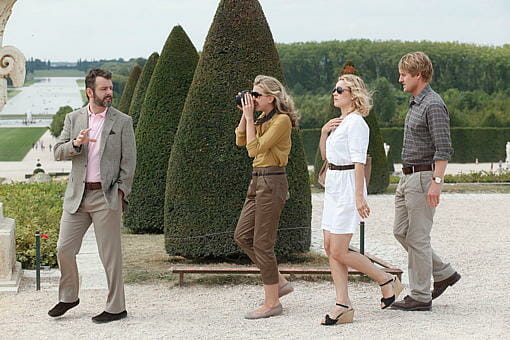By Brock Wilbur · May 23, 2011

On paper, it shouldn’t work. Yet another film about a naive screenwriter who somehow becomes a magnet for women far out of his league. Set in Paris. Built solely from references that only a small percentage of American audiences would get.
But it’s easily the most fun (and probably most complete) Woody Allen film in years.
Midnight In Paris follows Gil Pender (Owen Wilson), a writer struggling to make the transition from hack screenwriter to serious literary persona. He’s on vacation in Paris with his fiancée (Rachel McAdams) and her family, trying to explore the city of his dreams. He’s a Golden Age yearner, dreaming of the greatest artistic era of all time: Paris in the 1920’s. Suddenly, with no explanation, he begins teleporting back to that time and place every night at midnight.
What follows are Pender’s adventures partying with the likes of Scott and Zelda Fitzgerald, Earnest Hemingway, Gertrude Stein, Salvador Dali, and a few dozen more of the greatest artists and eccentrics who ever lived, brought to life by an all-star cast. I cannot emphasize enough that Corey Stoll’s portrayal of Hemmingway steals the movie with every appearance. Hands down the best supporting acting I’ve seen in a movie this year.
Meanwhile, in the present, Pender’s engagement begins to fall apart as he spends his nights alone traversing Paris (and time). In the twenties, he falls for a fashion designer and muse played by Marion Cotillard, who never has to be anything more than French and charming, which she has some experience with. Her character is completely unhappy with the 1920’s, and wishes she could live in the Golden Era of culture: Paris at the turn of the Century. Through her yearning, Pender manages to see the escapism and denial in his own desires, and struggles to find happiness in the present rather than lose himself to the past.
Allen makes the very smart decision to just allow the film to be fun and fantastic, without sweating the details. Pender’s time travel vessel takes the form of a car, which pulls around to pick him up each night. There’s no explanation for why he’s able to travel back to the 1920’s, nor how he can return. But the rules would have just detracted from a film that survives and thrives on how much fun this fantasy can become.
At the midpoint, Pender makes mention of how he doesn’t think any piece of artwork can compare to a city, as is clearly Allen’s thrust for this film. So much so that the opening sequence is just a four-minute montage of various parts of Paris set to music, followed by the opening dialogue all occurring over a black screen. Allen lets us know from the beginning that Paris is the main character of this film, and never looks back. Some sequences throughout seem to go on too long, especially wordless sections with Pender exploring, but they’re only too long if you consider them in service to the character of Pender, not the character of Paris.
For me, the triumph of the film was in the choice to build a focus on this world, the Paris of the twenties, and its collection of authors and artists. To a very small subset of romantics and Francophiles, there could be nothing more exciting in the world, and so it winds up being a film whose audience is really only the people who would identify themselves as being exactly the main character. If you don’t similarly pine for a chance to get drunk and watch the Fitzgerald’s fight, you’re probably not the kind of person who’ll enjoy a film with sly one-off jokes about the dancing style of Djuna Barnes. Similarly, Allen’s inclusion of jokes at the expense of Tea Party Republicans further moves to distance anyone except a very small subsection of viewers. But if you fall into this films sweet spot, you’ll be infinitely happier with it than say, Baz Luhrmann’s upcoming “Gatsby” film.
It’s an adorable film with a great number of laughs and some truly outrageous performances. At some points the cameos and diversions become a bit much, and you wish you could stay with a character long enough to watch them develop an arc, but it’s still a smart, well rounded, and simply executed story. Exactly the sort of film Woody Allen hasn’t been making lately. Welcome back, sir.